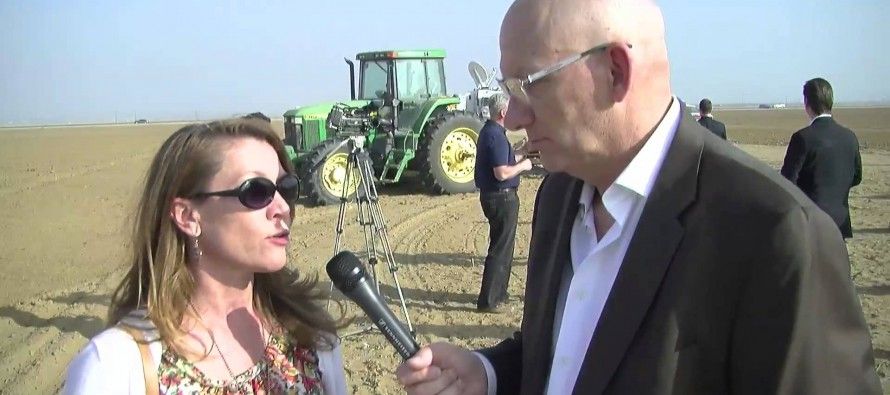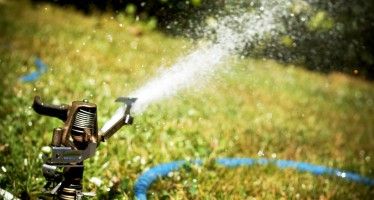Dems, GOP fight drought battle on national stage

After declaring a drought emergency last week, in his Wednesday State of the State address Gov. Jerry Brown pledged to work for solutions.
Escaping the snow-stormy Northeast, also on Wednesday U.S. Speaker of the House John Boehner, R-Ohio, held a drought rally with fellow Republicans in Kern County. ABC News in Fresno reported:
“From Washington D.C. to the fallow cotton field in Bakersfield, House Speaker John Boehner stood up next to Central Valley Congressmen Devin Nunes, David Valadao, and Kevin McCarthy who all support the proposed legislation to stop river restoration in favor of drought relief.
“‘How you can favor a fish over people is something the people in my part of the world would not understand,’ said Boehner.”
Here’s what’s behind the headlines. The specifics aren’t clear, but what’s known so far is that a new bill by Nunes, so far without a number, would revive his H.R. 1837, the San Joaquin River Valley Water Reliability Act of 2012.
H.R. 1837 did not pass. But it tried to repeal H.R. 146, San Joaquin River Restoration Settlement Act of 2009, by Sen. Dianne Feinstein, D-Calif. Her bill emphasized the environment over local water allocation. (H.R. 146 originated as battle landmarks legislation, but was modified; hence the “H.R.,” House Resolution, designation, instead of “S.” for Senate Resolution.)
The correlation of political forces changed in the past three years, with the drought striking California and with Democrats worried about losing California House seats in November. (No California U.S. Senate seat is open this year.)
Additionally, Nunes’ bill would create a joint House-Senate committee on California’s drought problems that would take control of federal water transfers to the State Water Project by usurping Brown’s new Drought Task Force.
Republicans usually push “federalism” and local control, but are using the drought for federal power to trump state power.
Rally
Will the GOP rally actually bring more water to Californians? A sharp response was given by Bakersfield Californian reporter Lois Henry in a video interview given at the rally. She is widely regarded as a frank and independent voice on California’s water situation. She said:
“No! So far what they have described has already been pushed in the House by Devin Nunes numerous times and died at the Senate every time…. This is mainly something to put pressure on Dianne Feinstein. This is her home state. This is affecting her constituents as well…. They are serious about pushing this bill, but this is really something to push Dianne Feinstein…. The devil is in the details of the new bill proposed by Nunes and thus far there are no details.”
Henry was skeptical that another new bill proposed by Nunes would work. Even if it passed, she warned, it would invite endless lawsuits. “We will see snow in the Sierras before we will see that bill passed,” she quipped.
And Rep. George Miller, D-Martinez, branded the proposed GOP bill “misguided” and “dangerous.”
Court settlement
Feinstein’s bill, H.R. 146, was intended to comply with a court-ordered settlement 18 years ago to restore salmon runs along the San Joaquin River by diverting water from farmers. H.R. 146 requires farmers to pay for up to $800 million of river restoration costs from higher farm water rates; $180 million will be collected from farmers by 2014.
California was to pay $200 million of this cost from two water bonds voters passed in 2006: Proposition 84, $5.4 billion; and Proposition 1E, $4 billion. However, the propositions did not provide for drought relief for farmers.
The court settlement requires 247,000 acre-feet of water to be diverted from farmers in dry years and about 356,000 acre-feet of water in wet years. That would be roughly enough water to irrigate from 82,333 to 118,667 acres of farmland each year.
A provision in H.R. 146 to allocate $102 million of funds collected from farmers’ higher water rates to replenish lost farm water has never been implemented.
As reported in the San Francisco Chronicle, Tom Nassif, president of Western Growers, charged federal regulators worsened the situation last year “by failing to pump and store 800,000 acre-feet of water runoff” by letting it run to the sea.
And in a statement released at the drought rally, he urged, “It’s time for Congress to act.”
What is particularly aggravating to Central Valley farmers is that their allocation of water this year has been cut back by 95 percent after they have paid $180 million for more fresh water for fish, even though the water ended up flowing to the Pacific Ocean. Farmers have ended up paying for their own demise.
Explosive crisis
State Sen. Jean Fuller, R-Bakersfield, said in an interview that it was only a matter of time before the farm economy is dead; that it won’t be long before many Northern California communities that normally don’t suffer from droughts are going to be parched right behind the farmers; and that there is no contingency plan for providing for a drought of this kind.
She said it’s embarrassing that President Obama has not even responded to the letters from Republican state legislators calling for immediate action. And she said that, even if Brown suspended California’s environmental laws to aid in drought relief actions, that federal environmental laws also would have to be suspended.
She warned, “It is only a very short time before this crisis explodes.”
Related Articles
CA judge scraps assisted suicide suit
In another potent setback for California’s right-to-die advocates, a judge threw out a lawsuit brought by three residents trying to
Water board unveils steep CA cuts
As a closely-watched court ruling threw California’s tiered water pricing system into disarray, the Water Resources Control board made public
Video: CalWatchdog in depth — High Speed Rail (3)
CalWatchdog Contributor Kathy Hamilton is concerned about the tone of the Appeals Court hearing she attended concerning lawsuits filed against




